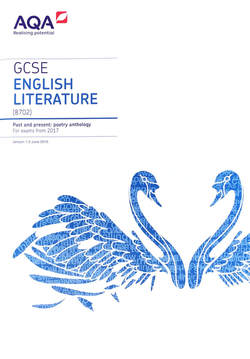Poetry Essay
Support for studying English GCSE and A Level
English Learning ResourcesPlease visit Poetry Essay's TES shop for a range of English resources.
|
Exemplar English Literature EssaysA range of student-style English Literature essays.
|
Poetry ExploredBiographies of poets and several annotated poems.
|
Romeo and Juliet EssaysModel Romeo and Juliet essays for the AQA exam board.
|
A Christmas Carol EssaysModel A Christmas Carol essays for the AQA exam board.
|
An Inspector Calls EssaysModel An Inspector Calls essays for the AQA exam board.
|
Power and Conflict EssaysModel Power and Conflict poetry essays for the AQA exam board.
|
Unseen Poetry
|
|
Need to write about poems? Stuck on what to say and how to say it? Not sure about how to organise an essay? This interactive Poetry Essay PowerPoint presentation helps you analyse poems and write essays about them more confidently. It features: structured paragraphing (point, evidence, explain, link); writing frames; sentence starters; annotation prompts; poetic terms simplified with examples; connectives (conjunctions); stanza names and other helpful hints. Poetry Essay Analysis PowerPoint presentation is also bundled with a printable poetry essay template.
|
|
|
Analysing a poem can be tricky. Before you analyse a poem in detail, it is important to read through the poem several times. Try to read the poem aloud, because poems can often have a range of sound devices that can alter the poem's meaning.
Once you've read through the poem, you can start analysing the poem's content. Here are six steps to help you to analyse a poem: Step 1: Subject. What is the poem about and why? Step 2: Theme. What are the recurring ideas and topics in the poem? Step 3: Tone. How would you describe the mood of the poem's language? Step 4: Imagery. What literary devices are used by the poet and what do they signify? Step 5: Form. Why the poet has chosen this structure? Step 6: Feeling. What are the different emotions being conveyed within the poem? For more detailed prompts on how to analyse a poem, please see the video: |
|
|
Click here for previous English Language and English Literature GCSE grade boundaries for AQA examination board. The GCSE grade boundaries have been divided into each series (2017-2021). These will help you to identify what mark is required to get a particular GCSE grade (1-9) in English Language and English Literature (AQA).
|
AQA Power And Conflict Poems Analysed - Video GuideClick here for the AQA Power and Conflict poems which have been analysed in detail.

Click here for a full mark essay on the AQA Power and Conflict poems.
There are 15 AQA Power and Conflict poems which students are required to analyse for the GCSE English Literature poetry exam (AQA English Literature Paper 2). AQA states that students should study all 15 poems in their chosen cluster and be prepared to write about any of them in the examination. If you need help analysing the collection of AQA Power and Conflict poems please browse the videos. Each of the Power and Conflict poems have been concisely annotated to support your analysis and interpretation. The annotation prompts are a supportive tool, intended to encourage further analysis and interpretation. Alternatively, visit YouTube for the AQA Power and Conflict poems playlist. |
Download: AQA Power And Conflict Cluster Of Poems |
|
Here is an exemplar poetry essay, at GCSE standard, which compares two poems and almost attained almost full marks. This student-style poetry essay should take approximately 40 minutes to complete in exam conditions. This response may help anyone who is struggling to structure a poetry essay, which compares two poems. However, there might be aspects you’d like to change or other ideas you’d like to include. The exam question was: Compare how poets use language to present feelings in ‘The Manhunt’ by Simon Armitage and ‘Quickdraw’ by Carol Ann Duffy.
|
|
|
Here is an exemplar poetry essay, at GCSE standard, which analyses an unseen poem and attained full marks. This student-style poetry essay should take approximately 30-35 minutes to complete in exam conditions. This response may help anyone who is struggling to structure an unseen poetry essay. However, there might be aspects you’d like to change or other ideas you’d like to include. The exam question was: How do you think the speaker feels about the child and his experience of learning to read and how does the poet present the speaker’s feelings? The question was based upon the unseen poem called 'Slow Reader' by Vicki Feaver.
|
|
